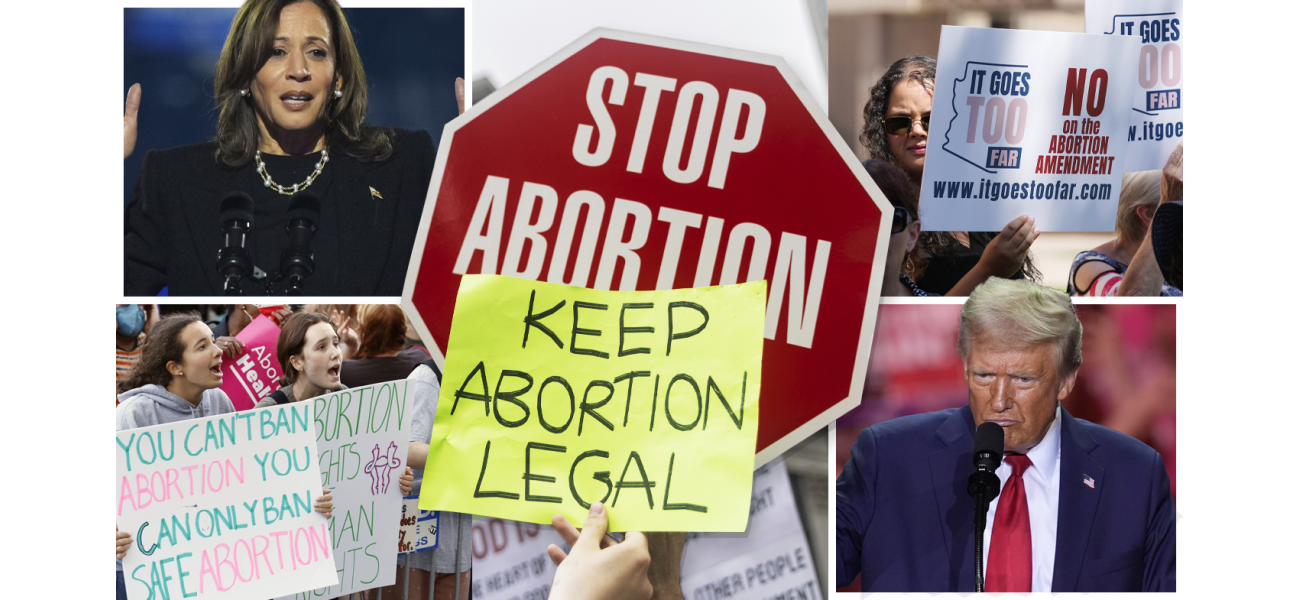"10 US states have another major item on the ballot to vote on."
In the US, elections involve more than just choosing a president, with abortion rights being a major issue in ten states.
November 6th 2024.

As the United States awaits the results of the tight race between Kamala Harris and Donald Trump for the presidency, voters are also making their voices heard at the ballot boxes in ten states. These states, including Arizona, Colorado, Florida, Maryland, Missouri, Montana, Nebraska, Nevada, New York, and South Dakota, are asking voters to decide on the issue of abortion access. Some states are seeking to expand access, while others are aiming to maintain their current laws. Only Nebraska is considering whether to enshrine abortion rights into its state constitution.
This topic has gained even more attention following the 2022 US Supreme Court decision to overturn the constitutional right to an abortion under Roe v Wade. As a result, states now have the power to implement their own rules surrounding abortion. This has made reproductive freedom a central issue in Harris' campaign, as she promises to protect the right to abortion nationally. She recently appeared at a rally in Texas with Beyoncé, where she stated, "I pledge to you, when Congress passes a bill to restore reproductive freedom nationwide, as president of the United States, I will proudly sign it into law."
Meanwhile, Trump has attempted to appeal to women by positioning himself as their protector. At a rally in Wisconsin last week, he declared, "I want to protect the women of our country. Well, I'm going to do it, whether the women like it or not. I'm going to protect them." With so much at stake, it's important for voters to understand what exactly they will be deciding on in these ten states.
In Arizona, abortion is currently legal up to 15 weeks. In cases of medical emergencies where the woman's life is at risk, or if there is a risk of substantial and irreversible impairment to a major bodily function, abortion is legal at any point during the pregnancy. Now, voters are being asked whether they want to expand access to abortion up to fetal viability, which is around 22 to 24 weeks, and enshrine it into the state's constitution.
Colorado currently has no restrictions on abortion, but voters will decide whether to maintain this level of access and enshrine it into the state's constitution. In Florida, abortion is currently illegal after six weeks, with exceptions for cases of rape, incest, or human trafficking. However, voters will be deciding whether to expand access up to fetal viability or in cases where the woman's life or health is at risk.
Maryland currently has no restrictions on abortion, and voters will decide whether to maintain this level of access and enshrine it into the state's constitution. In Missouri, abortion is illegal except in medical emergencies, with no exceptions for cases of rape, incest, or human trafficking. Voters will be deciding whether to expand access up to fetal viability and enshrine it into the state's constitution.
Montana allows abortion up to fetal viability, with exceptions for cases where the woman's life or health is at risk after that timeframe. Voters will decide whether to maintain this access and enshrine it into the state's constitution. Nebraska, on the other hand, currently only allows abortion up to 12 weeks and is considering whether to legalize abortion up to fetal viability or enshrine the current ban.
In Nevada, abortion is currently legal up to fetal viability, and voters will decide whether to maintain this access and enshrine it into the state's constitution. New York also allows abortion up to fetal viability and after that timeframe in cases where the woman's health, life, or pregnancy is at risk. Voters will decide whether to maintain this level of access and enshrine it into the state's constitution.
Finally, South Dakota only allows abortion in cases where the woman's life is at risk, with no exceptions for cases of rape, incest, or human trafficking. Voters will decide whether to expand access to allow abortion in the first and second trimesters with regulations. These are important decisions that will have a significant impact on the lives of women across the country.
This topic has gained even more attention following the 2022 US Supreme Court decision to overturn the constitutional right to an abortion under Roe v Wade. As a result, states now have the power to implement their own rules surrounding abortion. This has made reproductive freedom a central issue in Harris' campaign, as she promises to protect the right to abortion nationally. She recently appeared at a rally in Texas with Beyoncé, where she stated, "I pledge to you, when Congress passes a bill to restore reproductive freedom nationwide, as president of the United States, I will proudly sign it into law."
Meanwhile, Trump has attempted to appeal to women by positioning himself as their protector. At a rally in Wisconsin last week, he declared, "I want to protect the women of our country. Well, I'm going to do it, whether the women like it or not. I'm going to protect them." With so much at stake, it's important for voters to understand what exactly they will be deciding on in these ten states.
In Arizona, abortion is currently legal up to 15 weeks. In cases of medical emergencies where the woman's life is at risk, or if there is a risk of substantial and irreversible impairment to a major bodily function, abortion is legal at any point during the pregnancy. Now, voters are being asked whether they want to expand access to abortion up to fetal viability, which is around 22 to 24 weeks, and enshrine it into the state's constitution.
Colorado currently has no restrictions on abortion, but voters will decide whether to maintain this level of access and enshrine it into the state's constitution. In Florida, abortion is currently illegal after six weeks, with exceptions for cases of rape, incest, or human trafficking. However, voters will be deciding whether to expand access up to fetal viability or in cases where the woman's life or health is at risk.
Maryland currently has no restrictions on abortion, and voters will decide whether to maintain this level of access and enshrine it into the state's constitution. In Missouri, abortion is illegal except in medical emergencies, with no exceptions for cases of rape, incest, or human trafficking. Voters will be deciding whether to expand access up to fetal viability and enshrine it into the state's constitution.
Montana allows abortion up to fetal viability, with exceptions for cases where the woman's life or health is at risk after that timeframe. Voters will decide whether to maintain this access and enshrine it into the state's constitution. Nebraska, on the other hand, currently only allows abortion up to 12 weeks and is considering whether to legalize abortion up to fetal viability or enshrine the current ban.
In Nevada, abortion is currently legal up to fetal viability, and voters will decide whether to maintain this access and enshrine it into the state's constitution. New York also allows abortion up to fetal viability and after that timeframe in cases where the woman's health, life, or pregnancy is at risk. Voters will decide whether to maintain this level of access and enshrine it into the state's constitution.
Finally, South Dakota only allows abortion in cases where the woman's life is at risk, with no exceptions for cases of rape, incest, or human trafficking. Voters will decide whether to expand access to allow abortion in the first and second trimesters with regulations. These are important decisions that will have a significant impact on the lives of women across the country.
[This article has been trending online recently and has been generated with AI. Your feed is customized.]
[Generative AI is experimental.]
0
0
Submit Comment





